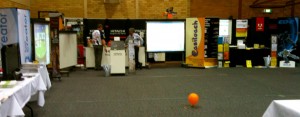A week ago, I was still in sunny Sydney with my colleagues waiting to get some taxis out to the airport after the giant prize draw at the end of IWBNet09. My group did OK in that regard - one colleague won a year's subscription to some form of software and another won a class set of ActivExpresssions (she was from DECS Learning Technologies but assures us that our school can borrow them at some stage) - but that is a bit of a worrying trend that I wasn't that fond of. I know the drill about conferences can't survive without vendors and vendors pay the bills and that the vendors need to get value for their time and dollars but my parting memory of this conference is the big prize giveaway of "complete literacy programmes", "essential IWB software" and "student polling devices". Normally rational minded educators had played the game as well, gathering stamps in their vendor hall booklet, hearing every single sales pitch just for a chance to experience the "The New Price Is Right" atmosphere at the end.
I'll have to admit that I only saw part 1 of Martin Levins' keynote as my nerves told me to go and set up for my Saturday morning session. (An unusual concept - a two part keynote over two days which meant that I never really knew what he was leading up to.) He did point to this Saturday Night Live sketch which was good for a laugh - but maybe a more powerful keynote for challenging thinking would be someone like Jason de Nys. (Note to self - reflecting on one's own ICT journey over several decades does not make for enthralling listening.)
So what did I make of the sessions I did attend? Here is a quick summary.
Belinda Anderson - All Things Google.
Shovel an excessive amount of people into one classroom and have someone talk and demo their way through the four Google tools. Listed as a vendor session - would have been better as a workshop where delegates would have a chance to play. Belinda herself was bright and breezy but I had to squeeze out of the room to set up for my session on Effective Design.
Sally-Anne Walton - Catering for Different Learning Styles Using the IWB
I'd just finished off my session on Social Bookmarking in the same room so it was amusing to see people turning up for this one grabbing a copy of my handouts on their way in. This session proved to me that one must read the abstract as well as the title before choosing a session to attend. There was very little link made to learning styles in this session from my perspective - and it seemed to be massive show and tell grab bag of IWB use. The first five minutes were spent talking about how to choose the right position for an IWB in your classroom and I must admit, I lost interest from there very rapidly. The presenter showed that she had embedded video footage from a digital camera on her IWB - but failed to tell us why - what were the learning goals and how did the video footage help to reach those goals? It finished on a note with the presenter's colleague plugging a vendor's teacher amplification system and proclaiming that the ActivStudio library was the premier place to find digital resources (what about the internet?)
I do feel a bit unsporting to airing a negative review but these are my honest responses and I'd hope that someone would make a similarly honest and challenging assessment of any of my presentations. We don't improve if tips and tricks are portrayed as innovative practice.
Moodle On The SmartBoard - presenter not on my original list.
IWBNet09 had what were titled vendor sessions each day where the vast majority of sessions in that time period were from, well, vendors! As I'd already spoken at length with Bryn Jones about Atomic Learning late on Friday afternoon, I decided to skip his session which I had planned to attend, and went along with two of my colleagues to the above mentioned session at the last minute. I'll have to admit here that my professional conduct here was very poor, as I started talking to Trudy throughout the session in low hushed tones. We were hushed by a gentleman in front who was genuinely interested in seeing how to embed a worksheet screengrab in a Moodle to be displayed on a SmartBoard being operated by a tablet. I should have voted with my feet and followed Dan Meyer's five minute rule.
Enhancing Literacy Through An IWB - Kel Hathaway
Now, Kel is a very nice guy with an entertaining manner, and his session held his audience captive. But I couldn't get past the fact that it was a literacy focussed Tips and Tricks session, one of the most proficient I'd ever seen. There were "Ooohs" and "Aaahs" on almost every turn of his flipchart page where he covered everything from Wordle to spelling with Flickr to downloading magic erasers from Promethean Planet. He'd make a great trainer for Promethean, for sure but I'm sure there is greater depth to his expertise and knowledge than what this session permitted him to cover. My notes showed my mindset as I sat through this session - How could I use this file or idea to help my kids? Can this be used independently of the teacher? How about the kids creating instead of all the various incarnations of flipchartery promising many long nights for teachers as they created these "engaging" digital masterpieces?
I do feel like a pariah for feeling unsatisfied with IWBNet09. A quick look at the tweets from the #IWBNet09 hash show that many people thought it was great - and queried my less than enthused demeanour. I guess I wanted to spend more time talking about the learning and actually "pushing the boundaries".




